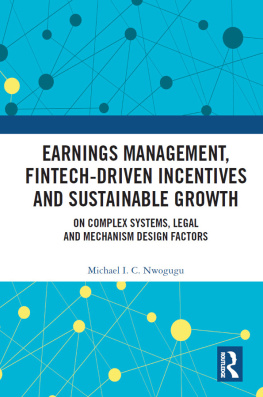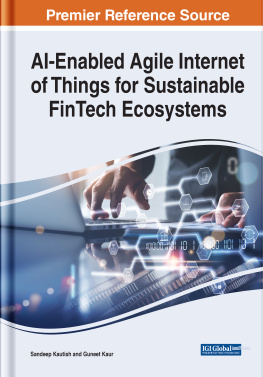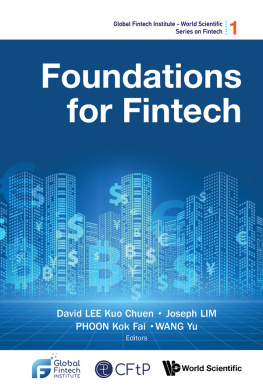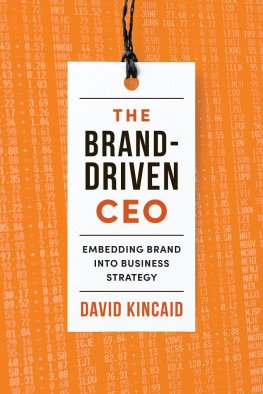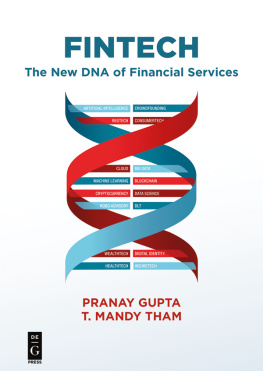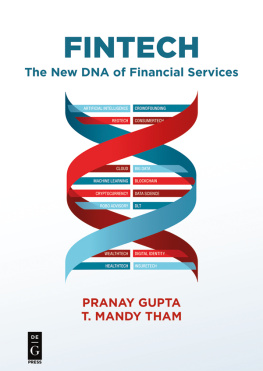Michael I. C. Nwogugu - Earnings Management, Fintech-Driven Incentives and Sustainable Growth
Here you can read online Michael I. C. Nwogugu - Earnings Management, Fintech-Driven Incentives and Sustainable Growth full text of the book (entire story) in english for free. Download pdf and epub, get meaning, cover and reviews about this ebook. year: 2019, publisher: Taylor & Francis (CAM), genre: Business. Description of the work, (preface) as well as reviews are available. Best literature library LitArk.com created for fans of good reading and offers a wide selection of genres:
Romance novel
Science fiction
Adventure
Detective
Science
History
Home and family
Prose
Art
Politics
Computer
Non-fiction
Religion
Business
Children
Humor
Choose a favorite category and find really read worthwhile books. Enjoy immersion in the world of imagination, feel the emotions of the characters or learn something new for yourself, make an fascinating discovery.
- Book:Earnings Management, Fintech-Driven Incentives and Sustainable Growth
- Author:
- Publisher:Taylor & Francis (CAM)
- Genre:
- Year:2019
- Rating:3 / 5
- Favourites:Add to favourites
- Your mark:
- 60
- 1
- 2
- 3
- 4
- 5
Earnings Management, Fintech-Driven Incentives and Sustainable Growth: summary, description and annotation
We offer to read an annotation, description, summary or preface (depends on what the author of the book "Earnings Management, Fintech-Driven Incentives and Sustainable Growth" wrote himself). If you haven't found the necessary information about the book — write in the comments, we will try to find it.
Earnings Management, Fintech-Driven Incentives and Sustainable Growth — read online for free the complete book (whole text) full work
Below is the text of the book, divided by pages. System saving the place of the last page read, allows you to conveniently read the book "Earnings Management, Fintech-Driven Incentives and Sustainable Growth" online for free, without having to search again every time where you left off. Put a bookmark, and you can go to the page where you finished reading at any time.
Font size:
Interval:
Bookmark:
Earnings management and the efficiency of Incentive Mechanisms and Fintech (and their significant impact on economic planning/modelling, public policy and quality of life) remain significant problems in both developed and developing economies around the world; and have substantial implications for sustainability (economic, social, urban and environmental sustainability), economic growth, risk regulation, risk management, systemic risk and financial stability; all of which affect pension plans, household wealth and government policies. Unfortunately, legislatures and the executive branches of government and the judiciaries in most countries have not been able to properly address this problem. Most regulations that were intended to reduce earnings management and or improve the efficiency of Incentive Mechanisms and Fintech have been ineffective or costly to implement. The nature, evolution and psychological effects of associated Incentive Mechanisms and Fintech (for both individuals and corporate entities) have become dominant institutions that affect sustainability, risk-taking and risk management.
This book differs from all other books on Earnings Management, Inequality and Sustainable Growth in the following ways:
- i)The approaches used include Qualitative Reasoning (see: Forbus (2019), Halpern (2003), and Bredeweg and Struss (Winter 2003)), Critical Theory, Capital Dynamics Theory (introduced in this book), Mechanism Design and Complex Systems Theory.
- ii)This book introduces Asset-Quality Management and Incentive-effects Management as distinct classes of actionable Disclosure-Misconduct (civil and or criminal liability) or ethics violations (some of which were formerly bundled together as Earnings Management).
- iii)This book does not focus on specific types and instances of earnings management, but rather, focuses on behavioral biases, and the Incentive Mechanisms and institutions that can facilitate Earnings Management and Incentive-effects Management (as broadly defined), Inequality and Fintech Gaps (explained herein and below); and or affect Sustainable Growth, Enforcement and Capital Dynamics Theory. This book addresses the behavioral effects of accounting rules and the auditee-firms and auditors Group Decisions (causes and effects) that pertain to Disclosure-Misconduct within the context of the firm, regulatory regimes and sustainability all of which often have Multiplier Effects. Collectively, such analysis can help improve Computer Science, Physics, Decision Sciences and Artificial Intelligence models that are used to identify or predict financial statement fraud, Corporate Bankruptcy and or Non-Compliance, and to model Portfolio Management, Financial Stability, Asset Pricing, Household Dynamics/Allocations, Consumer Behavior, Retailing Trends, Personal Growth, Organizational Psychology trends, International Contagion (of Cultures, Beliefs, Usage-of-Trade, technologies, market-volatility, Corporate Governance; enforcement patterns; etc.), and Public Policy.
- iv)Various parties have estimated that more than 80 percent of all equity and futures trading in the USA and perhaps other countries is now automated/algorithmic; and one implication is that most traditional research on Market Microstructure, Risk-Perception, Household dynamics/allocations, Preferences and Reasoning is misleading or incomplete. This book helps in bridging that gap.
- v)This book addresses the efficiency of regulations that affect the incentives (of firms, employees; and auditors) to perpetrate Earnings Management, Incentive-effects Management and or Asset-Quality Management.
- vi)The book addresses the macroeconomic, Public Health and International Political Economy dimensions of Earnings Management, Asset-Quality Management and Incentive-Effects Management including Inequality and Environmental Auditing.
- vii)The book introduces Economic Psychology and Behavioral Operations Research theories that pertain to two classes of assets that generate or can generate more than 60 percent of all earnings management and asset quality management and substantial Sustainability problems, and ironically also generate a substantial portion of economic growth in many developed countries which are Intangible Assets and Real Estate. The book analyzes issues in the Global Real Estate Markets and the Global Intangibles Economy that related to Antitrust, Group Decisions, Behavioral Biases, Consumer Behavior, and the efficiency of Incentive Mechanisms.
- viii)The book addresses Earnings Management, Asset-Quality Management and Incentive-Effects Management and their Multiplier Effects in developing countries and Less-Developed Countries.
- ix)The book addresses critical issues that pertain to Trust, Perception and Cooperation in markets, and to Preferences, Beliefs and Reasoning (all of which are widely debated in HCI, Fintech and AI).
- x)From Mechanism Design, Contract Theory, Dynamical Systems, Sustainability and Complex Systems Theory perspectives, this book addresses the following classes of issues:
- 1)Multi-sided Incentives that can reduce or increase earnings management, asset-quality management, sustainability and incentive-effects management such as Incentives, Fintech and ARS auctions. Such incentives actively involve two or more persons or classes of persons.
- 2)Many-person Re-generative Institutions such as Intangibles/Goodwill accounting rules; Fintech, AI, legal processes; etc.
- 3)Many-person Mechanisms that affect behaviors of Human/Automated Agents and can reduce or increase harmful group collusion, and the incentives for transparency and truthfulness.
- 4)The elicitation of: i) best preferences for organizations; ii) preferences of groups in organizations.
- 5)Complex adaptive systems.
Earnings Management, Incentive-Effects Management, violations of Securities Laws and associated Multiplier Effects (economic, psychological, political, social, contagion and capital markets) have been analysed from various perspectives including the following:
- i)Psychology (Economic Psychology and Organizational Psychology) and Consumer Behavior.
- ii)Retailing e.g. Retail financial services; franchising; Household Dynamics/Allocations; etc.
- iii)Telecommunications and Networks e.g. contagion in online social networks; investor networks; etc.
- iv)Corporate Finance see: Agrawal and Cooper (2017).
- v)Financial Engineering see: Kamran, Zhao, Ali and Sabir (2018).
- vi)Management-Science see: Chapman and Steenburgh (2010) and Chen, Wu, et al. (2017).
- vii)Operations-Research (Fintech and Artifical Intelligence) see: Knigsgruber and Palan (2015); Koskivaara (2000) and Calvo, Ivorra and Liern (2017).
- viii)Applied Math, Decision Sciences and Artifical Intelligence see: Zhou and Kapoor (2011); Dbouk and Zaarour (2017); Dikmen and Kukkocaoglu (2010) and Ngai, Hu, et al. (2011).
- ix)Computer Science (Fintech and Artifical Intelligence) see: Long, Song and Cui (2017) and Trigo, Belfo and Estbanez (2016).
- x)Political Geography see: Gross et al. (2016).
- xi)Political Economy see: Ding, Li and Wu (2018); Abeysekera (2003); Boczko (2000) and Gross, Knigsgruber, et al. (2016).
- xii)Physics see: Ma, Zhuang and Li (2011); Battiston and Glattfelder (2009); Kuzubas, mercikoglu and Saltoglu (2014) and Li, An, Gao, et al. (2014).
- xiii)Game Theory (Math) see: Shuotong and Yanxi (2012).
- xiv)Public Policy
Font size:
Interval:
Bookmark:
Similar books «Earnings Management, Fintech-Driven Incentives and Sustainable Growth»
Look at similar books to Earnings Management, Fintech-Driven Incentives and Sustainable Growth. We have selected literature similar in name and meaning in the hope of providing readers with more options to find new, interesting, not yet read works.
Discussion, reviews of the book Earnings Management, Fintech-Driven Incentives and Sustainable Growth and just readers' own opinions. Leave your comments, write what you think about the work, its meaning or the main characters. Specify what exactly you liked and what you didn't like, and why you think so.

